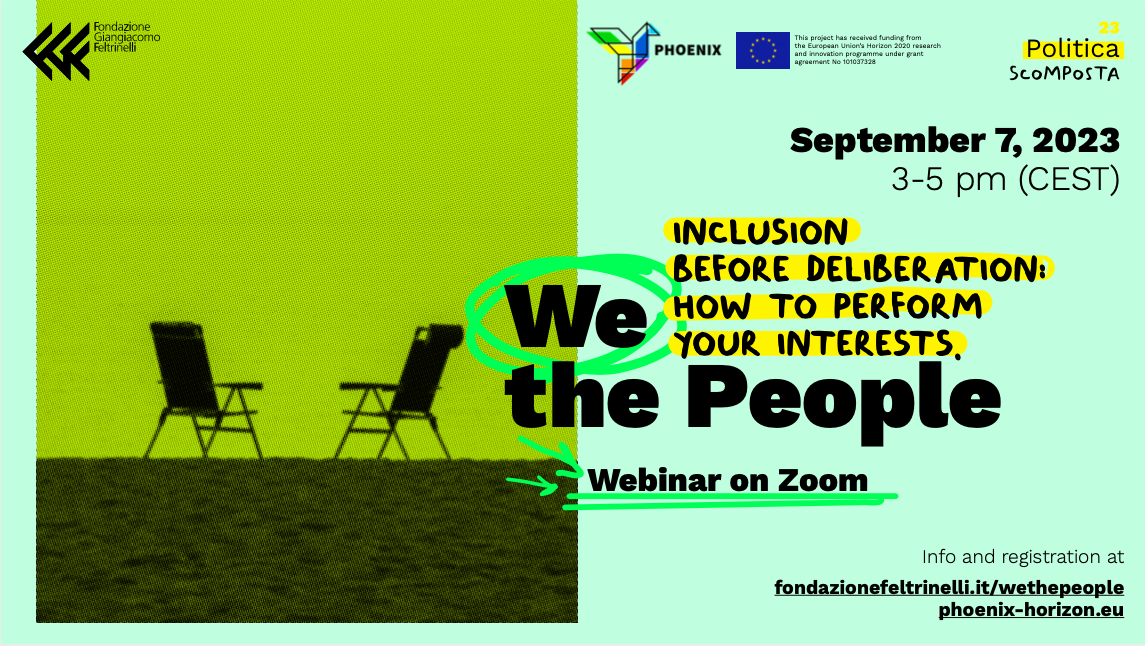7 September 2023 | 3-5 pm (CEST)

Inclusion Before Deliberation: How to Perform Your Interests
To ensure legitimacy, participatory processes should be as inclusive as possible. However, reaching vulnerable groups or marginalised communities can be challenging. On the other hand, influential stakeholders might opt out of public discussions, favouring alternative strategies to advance their interests.
Finally, certain entities such as future generations or Nature lack a voice at the table and require representation by others. How can we guarantee the presence of all pertinent stakeholders? How do we grasp and incorporate the concerns and requirements of those unable to be physically present?
Main speakers
Diogo Guedes Vidal
Researcher, CFE – Centre for Functional Ecology, University of Coimbra
Francesca Fazio
Member of Avventura Urbana
Andrea Felicetti
Senior Assistant Professor, University of Padua
Maarten de Groot (Moderator)
Consultant on Participatory Democracy, The Good Lobby
Roundtable participants
Alessandra Cardaci, Debating Europe
Alen Amirkhanian, American University of Armenia
Pierre- Etienne Vandamme, KU Leuven
Emilien Paulis, KU Leuven
Giulio Citroni, Uni Calabria
Agenda
15:00 – 15:05 Introduction greetings Fondazione Giangiacomo Feltrinelli
15:05 – 15:15 Introduction by Maarten De Groot (moderator)
15:15 – 15:30 Speech by Diogo Guedes Vidal
15:30 – 15:45 Speech by Francesca Fazio
15:45 – 16:00 Speech by Andrea Felicetti
16:00 – 16:40 Roundtable
16:40 – 16:55 Q&A by auditors
16:55 – 17:00 Closing remarks
Links:
About "We the People. The Rise of Citizens’ Voices"
Is it a crisis of democracy, or rather a crisis of participation within democracies, that we are facing? What factors contribute to the growing tendency to limit citizens’ involvement in the electoral process?
The issue of the complex, yet virtuous, relationship between information, liberal democracy, and the market economy has been extensively researched and analyzed. Recent high-tech innovations have posed significant challenges as they occurred amid geopolitical transformations, such as the end of the bipolar world, the European Union’s rapid expansion, and the collapse of the social prestige of the intermediate bodies. These changes have occurred alongside dramatic globalization, the rise of neoliberalism, and a prevailing culture of narcissism and individualization.
As a result, we find ourselves in a representative system that fails to adequately address people’s demands. The only way out of this democratic deficit is a renewed and fruitful dialogue between the public and institutional spaces. How can we reconnect citizens with administrative representatives? How can we overcome the top-down technocratic management and ensure that citizens’ voices actually contribute to policy co-creation? To answer these crucial questions, we must explore the trends of Democratic Innovations (DIs) and the potential benefits of the improvement of digital democracy.
Deliberative and participatory democracy becomes even more vital if we aim at pursuing the green transition, as any transformative process requires broader support to be efficient.
Moreover, we cannot achieve an equal, just, and sustainable Green Deal unless we acknowledge the interests of those who will mostly be impacted by decision-making.
On the other hand, a technocratic approach will result in backlash, as there is no flawless and encompassing solution that can be posed to the climate crisis and get a unanimous consensus. What matters, instead, is that throughout the process, people’s needs are duly considered, debated, and represented.
This is the driving force that inspires the work of the PHOENIX Project: to gather civil society, stakeholders, practitioners, and anyone capable of contributing valuable discourse while advocating for the interests of the least represented and advantaged individuals in society.
The purpose of this series of webinars is to empower participants to become acquainted with the latest trends in Democratic Innovations while investigating the potential and the obstacles facing participatory and deliberative democracy. Following each workshop, we will contemplate how to foster participation beyond the local level and include the interests of minorities by placing them in the context of larger citizen groups. We will reflect on the conditions for thriving participatory processes based on mutual trust and respect, and whether such democratic experiments can actually reduce the gap between participation and representation.

Follow us on: